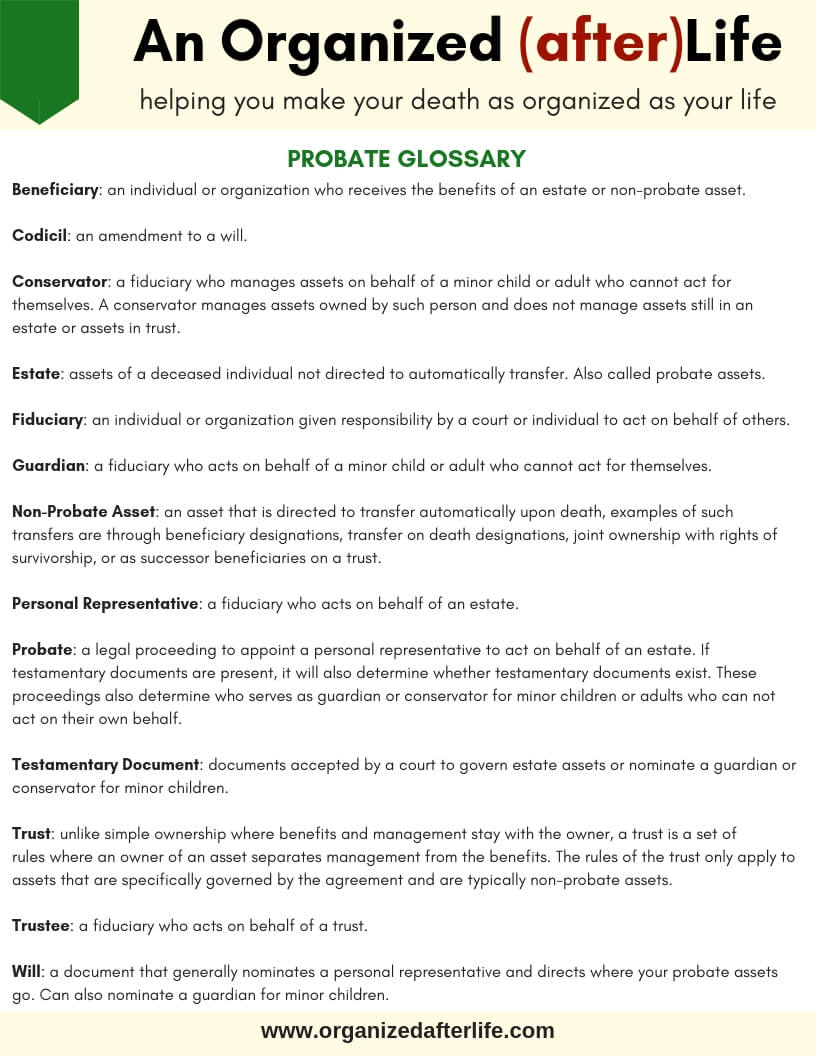
25 Oct Probate Terms
Probate and Estate Planning are things most of us will and should deal with. But, they’re confusing. So let’s pull back to the basics. All these words that get used? What’s the definition? What do these terms actually mean? Here’s a glossary of probate terms to help you get started.

First. Let’s talk assets. Asset transfers are the most typical legal issue to come up after a death. How the assets transfer set everything else.
- Non-Probate Asset: an asset that is directed to transfer automatically upon death, examples of such transfers are through beneficiary designations, transfer on death designations, joint ownership with rights of survivorship, or as successor beneficiaries on a trust.
- Estate: assets of a deceased individual not directed to automatically transfer. Also called probate assets.
Next, let’s talk documents. Documents give the rules about where things go, how they go, and who is responsible to get it there.
- Trust: unlike simple ownership where benefits and management stay with the owner, a trust is a set of rules where an owner of an asset separates management from the benefits. The rules of the trust only apply to assets that are specifically governed by the agreement and are typically non-probate assets.
- Testamentary Document: documents accepted by a court to govern estate assets or appoint a guardian or conservator for minor children.
- Will: a document that generally nominates a personal representative and directs where your probate assets go. Can also nominate a guardian for minor children.
- Codicil: an amendment to a will.
Now, let’s talk about the people. Those who have responsibility of getting things where they need to go and those who receive the assets or the benefits of the assets.
- Beneficiary: an individual or organization who receives the benefits of an estate or non-probate asset.
- Fiduciary: an individual or organization given responsibility by a court or individual to act on behalf of others.
- Conservator: a fiduciary who manages assets on behalf of a minor child or adult who cannot act for themselves. A conservator manages assets owned by such person and does not manage assets still in an estate or assets in trust.
- Guardian: a fiduciary who acts on behalf of a minor child or adult who cannot act for themselves.
- Personal Representative: a fiduciary who acts on behalf of an estate.
- Trustee: a fiduciary who acts on behalf of a trust.
And finally the process.
- Probate: a legal proceeding to appoint a personal representative to act on behalf of an estate. If testamentary documents are present, it will also determine whether testamentary documents exist. These proceedings also determine who serves as guardian or conservator for minor children or adults who can not act on their own behalf.
Did a light bulb go off? Is this really good information you want to save for reference? Or, share with others, like your family members or clients? Save on Pinterest and share on Facebook, Twitter and Instagram. And, I have a free downloadable pdf. Just click and receive the downloadable pdf to your inbox. Use for reference or share with friends, family, and clients.




No Comments